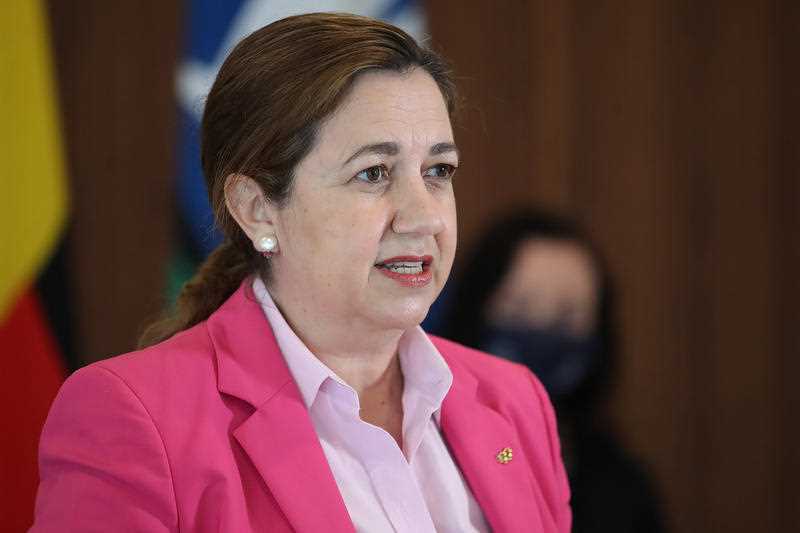Details of Queensland’s back to school plan have been released just over a week before classes return, as the state records 13 virus deaths and 8580 new cases.
Two of the people who died were aged in their 60s, four were in their 70s, three were in their 80s, three were in their 90s, and one person was aged 105.
Premier Annastacia Palaszczuk says with the new term to begin on February 7, masks will be mandatory for high school students and “strongly encouraged” from year 3 upwards.
“Teachers can remove their masks to teach and students can remove them when seated,” Ms Palaszczuk said on Sunday.
“We want our schools to be a safe place … I want parents to have confidence and I want to make sure that the children know exactly what they need to (do) going back as well.”
Rapid antigen tests will be available in all Queensland schools and given to the parents of children who develop symptoms in class to take at home.
Likewise, teachers who develop symptoms on site will be able to collect a rapid test from the school.
Those who develop symptoms at home will have priority access to RATs at Queensland Health clinics.
Education Minister Grace Grace said she is confident the state has enough rapid tests for the policy to work effectively.
“If you are symptomatic, we want to get you home and get you tested,” she said on Sunday.
“We have thousands of tests available at the moment that will be ready for day one on the seventh of February.”
School camps, excursions, assemblies and large gatherings will be suspended for at least the first four weeks and face-to-face staff meetings will be limited.
Visitors on school grounds will also be restricted with exceptions for parents and carers of vulnerable students, and all students in early childhood, kindergarten, prep and year 1.
There are 5000 fully vaccinated relief teachers on call to help manage any staff issues, Ms Grace said.
COVID-19 outbreaks will be managed on a case-by-case basis, with school closures a “last resort”.
Schools are already open for children of essential workers, and online learning returns for years 11 and 12 this week.
But with just a week to go before most students return to school, Health Minister Yvette D’Ath is still concerned about vaccination rates.
“Our 12-to-15-year-olds are still not at 70 per cent double dose … and they’re all going back to school in a week’s time,” she said.
“If your 12-to-15-year-old is concerned about getting this vaccination, take them to a local pharmacy or to a GP to have that conversation, or go into any one of our vaccination clinics and talk to the staff there.”
Meanwhile, there has been a “substantial decrease” in hospital numbers with 745 people currently admitted with COVID-19, compared to 833 on Saturday.
“We shouldn’t be paying too much attention to a single day, but that is a very substantial decline,” Chief Health Officer John Gerrard said.
“It’s hard not to feel that that is a real phenomenon that we’re observing.”
Intensive care patients have also decreased in the past 24 hours, down to 41 from 53.
And there is good news among health and ambulance staff who are off work due to infection or isolation, with the total figure falling from more than 6000 to 3411 since January 18.
The state’s double dose vaccination rate is inching toward 90 per cent and currently sits at 89.49 per cent of eligible people aged 16 and over.
Get all the latest Canberra news, sport, entertainment, lifestyle, competitions and more delivered straight to your inbox with the Canberra Daily Daily Newsletter. Sign up here.



